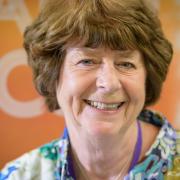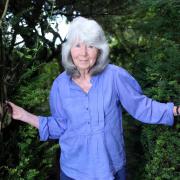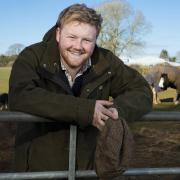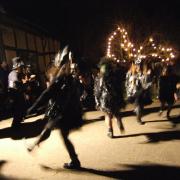Former police inspector and Cotswold Life columnist Clare Mackintosh tells Katie Jarvis how two tragedies - one very personal - inspired her much-lauded debut novel

“Ignore the dog until she’s calm,” Clare Mackintosh warns me. “Now… assume the brace position.”
A high velocity mass of fur and slobber sprints joyously towards me, causing me both to reel backwards and to yearn for a towel in an unprecedented sort of way. In calmer times, this is apparently Maddie, the spaniel. (Yes, she spells it with an ‘ie’; I checked.)
“Dog? What dog?” I gasp, gamely.
“No,” agrees Clare Mackintosh, wistfully. “I’ve always wanted one.”
That’s one of the things I love about Clare, as I’ve gradually got to know her: her dry sense of humour. Her Cotswold Life columns are often laugh-out-loud funny; often filled with a to-the-point analysis of everyday life (delivery drivers who don’t deliver; school paintings the RA would dismiss out of hand) that says exactly what you would have said, had you thought properly about it.
Her first novel, though – out in paperback this month – isn’t the romcom she once thought she might launch on an unsuspecting world. “Thankfully for everybody out there, that one will never see the light of day,” she grimaces.
What she’s written instead is a powerful, teasing, turning thriller exploring the darker side of human nature; the darker side of life. It’s uncomfortable; sometimes brutal in its violence; but compelling. In all honesty, the only book that’s ever surprised me in the same way – with an out-of-the-blue twist - is Rebecca. To date, I Let You Go has been sold to 11 countries, including Poland, Russia and the US.
What’s equally compelling is that the nub of the incident with which the story begins – a hit-and-run in which a child is killed – is based on a true event. A tragedy that played out in Oxford; a heinous crime that, to this day, has never been solved or resolved.

“My novel is not a story about what happened,” Clare says, carefully, as we drink coffee (“There’s no instant in this house”) in her light, bright Chipping Norton kitchen, a million miles from the seedier side of that city of half-dreaming spires.
“And I certainly didn’t think at the time that I was going to write about it.”
So. You’ll need a bit of context here. After a grammar-school education - a middle-class background - Clare had gone to university in Surrey, taking a degree in French and management; even spent a year in Paris, as part of the course, working as a bilingual secretary. Then, out of nowhere, she had “a sort of epiphany. I didn’t think I could do a job that was just about making money”. Instead, after watching a careers film on the police, she left with application form in hand and joined as soon as she’d graduated. That same year, a car hit a child in Oxford.
“The driver was never caught, despite lots and lots of community intelligence and huge efforts by the police. There were so many people talking about who had done it, but no one was prepared to give evidence; people were arrested but not charged. During the 12 years I was in the police, it never really went away.”
Everyone knew the name of the child who died. Everyone knew the name of the person suspected of being the driver.
But despite all that... Despite it all…
“And so I always felt really moved by the situation that this family were in – that they didn’t have that famous closure that everyone wants. And I suppose I was appalled by the fact that somewhere out there was – is – somebody who has done this thing.”
She shakes her head. Even after 12 years of policing, of seeing life at its best and its worst, she still doesn’t get it. “What drives someone to commit a crime that they don’t confess to? What drives someone to help that person cover it up? There are, at the very least, a handful of people who know what happened that night and won’t come forward… So I found that really intriguing.”
I don’t want to give too much more away about the book that, so many years later, revisited elements of this abomination in a fictional context. Suffice to say this. The very act of writing about tragedy suggests that it can be contained within words; that the writer can understand the subject; that something appalling can be relayed by grammar, described by adjectives, and explained by the logic of language. I know that’s not the case. But I want to say, in a faltering, utterly inadequate way, that there were other reasons why Clare Mackintosh ended up feeling empathy with a family raging and grieving for a lost child.
When Clare was posted on promotion to Chipping Norton as town sergeant, she loved it instantly. “It was like being in an episode of Heartbeat.” She laughs. “It was the sudden lack of crime that was amazing and an absolute joy. A bin being kicked over in the high street would make the news.”
There were the murders, the arsons, the thefts, of course; but nowhere near on the scale of city life. Instead, she began to learn how relationships worked in a Cotswold market town.
“I remember walking to the pub one night – off duty - and having to deal with a small-drugs seizure on my way. Because the person I’d come across in an alleyway was someone I knew, I couldn’t ignore it. And I wasn’t about to make an arrest; so we had a chat and I disposed of what he was smoking. And we went our separate ways.”
Nor did that sense of community confine itself to working life, as Clare was to discover. While she was working there, she and her husband went through a course of IVF. Their twin boys, Josh and Alex, arrived worryingly prematurely, on bonfire night, 2006. Three weeks later, Alex contracted meningitis. Two weeks after that, he died.
It’s difficult to write about this, never mind talk about it. But Clare does.
“It’s one of those things I can’t talk about without crying, but I’m all right.”
The town was amazing. People sent cards, flowers, messages of support; they made donations, via a special fundraising page, to the Meningitis Research Foundation. “I’d only been in the town two years but it was then that I felt I belonged.”
Did that surprise you?
“Yes. Because I was a police officer and not everyone likes police officers.”
People didn’t avoid you?
“Some people know what to say and some don’t. And out of the people who don’t know what to say, I suppose about half of those are able to say, ‘I don’t know what to say’ – which is fine – and the others are the ones who don’t say anything, which is horrible. But the thing about modern communication is that they can make a £5 donation and write a message on a Facebook page that says ‘I’m thinking of you’ in a way that they would find very hard to say face-to-face.”
I can’t imagine the complexities, emotionally; the complexities of losing a baby; the complexities of still having one twin.
“It was really complex. It’s something that I still can’t get my head round, really. But the day after Alex died - and it wasn’t as straight-forward as him dying; we had to choose for him to die - when perhaps another family might have shut themselves away and licked their wounds for a bit, we had to go back into the same hospital; into the same intensive care unit; walk past the empty incubator where our son had been; and care for our surviving son. And it was beyond difficult.”
But life had far from finished. Seven months later, the next June, Clare discovered the impossible had happened. She’d been told she’d never get pregnant naturally. Her body said differently.
“I was terrified. It was a massive shock that I’d fallen pregnant at all. Then I was terrified because I’d had this very, very premature birth. I’d had a haemorrhage after I’d had the boys where I’d nearly died.
“Everybody was very reassuring, saying, ‘This is a natural pregnancy. It’s only going to be one baby so you’ll have a lovely pregnancy.’
“But I said, ‘It’s going to be twins! It’s going to be twins again!’ I just felt it. And everyone was saying, ‘Don’t be ridiculous’. I felt utterly mad.”
To calm her, John Radcliffe agreed to an early scan; so, at nine weeks, she lay on another couch, waiting for another sonographer to place an ice-cold probe on her abdomen.
“And then I could see instantly there were two heartbeats. I tried to get off the table and get out. The whole thing was terrifying for me. I remember the sonographer saying, ‘There are choices. If this is going to be difficult for you, you don’t have to have both these babies’, which was an extraordinary thing to suggest to someone who had just had to choose not to have one of her babies.
“Then I was referred to the amazing, outstanding, brilliant Silver Star unit at the John Radcliffe [a special care unit for pregnant mothers] where I had fantastic care.”
Despite being told there was very little chance of carrying the babies to term – and despite the fact that Clare was in denial: “I didn’t for a second think I would come home from hospital with two babies. I wouldn’t buy two cots. I wouldn’t buy a double buggy” - Evie and Georgie were born at 37 weeks.
In theory – in practice – this was a wonderful outcome. But the trauma was still undeniably there. At home, with three children under 15 months, Clare seemed to be coping admirably.
“I was the one at toddler group, breastfeeding two girls and bottle-feeding a toddler, while wearing make-up and a pair of heels; everything very bright and shiny on the outside.
“But I remember looking at the girls and thinking, ‘These are the wrong twins! My twins are boys!’ And not telling anyone that. Objectively I loved them, in that I would rescue them from a burning building; and they were always well cared for…
“But I was watching all of this from the outside. I could see me having conversations and smiling and laughing and coping, and it was like it was somebody else. I had the most extraordinary feeling of detachment for three or four months. And I remember trying to tell the health visitor about it, saying things like, ‘I don’t feel quite as well bonded towards the girls but that’s completely normal, isn’t it?’ Just wanting, desperately, someone to identify what was happening.”
Finally, four months after the birth, she went to the GP, who quickly diagnosed post-natal depression. Once recognised, Clare recovered very quickly.
“I remember the day when I fell in love with the girls. My husband was at work and the children were all asleep and I felt this overwhelming need to go upstairs. I just sat in their room and suddenly realised that I loved them. And it was such a relief.”
Writing is often a form of salvation. It’s cathartic. And it means you can work things out alone, if you want to; but in a form you can share when you’re ready. Clare Mackintosh started, anonymously, with a blog. It was a blog that said very difficult things. “I felt really strongly that this sort of thing shouldn’t be a secret; shouldn’t be a shameful thing. That things like mental health were affecting so many people; and that losing a baby shouldn’t be a dirty secret.
“When Alex had died, we’d gone to see the undertaker about the funeral and he’d said, ‘Well, normally, in the case of babies, it’s a quiet, very quick service with family’. And I said, ‘But why? This is a person.’
“I don’t like the fact that, in this country, we won’t talk about it. And there’s no word for a mother who’s lost a child. You’re not a widow or an orphan. There’s no noun for who you are. People say lots of platitudes about the fact that you have other children and what a blessing it is; but having other children doesn’t make it any easier to lose one. It just gives you a reason to keep going, and that’s a good thing - but I wanted to talk about these things.”
As she blogged – in posts entitled More Than Just a Mother – she began getting messages. From women saying, ‘I’ve shown this blog to my husband/mother/friends because I can’t tell them myself but this says exactly how I feel’.”
The blog was also funny: “One of the truisms about tragedy is the humour that happens amongst it in the most unlikely places.” When Clare posted about being caught short on a long motorway journey, with three sleeping babies in the back of the car, a national newspaper picked it up. “I was caught in a very bad traffic jam – the sort you’re in for hours and hours - at a point where I was already bursting for the loo. And I didn’t know what to do; so, in the end, I used one of the children’s nappies. My blog was all about the difficulty of getting a nappy into a pair of skinny jeans, whilst not letting anyone see. And I just remember there was a pick-up truck I could see in my rear-view mirror, inching closer and closer. All the time I was thinking, ‘Is the nappy going to hold? Is it going to hold?’”
And?
“I’m delighted to report that a Pampers for age six months totally holds an adult wee. My children are now eight, seven and seven and I still, to this day, keep a nappy in my glove-box. Just in case.”
So successful has Clare been that she now writes full time. Her novel is the latest achievement in an array that covers national newspapers and magazines, and broadcasting.
Family life is happy; but no story is a simple one: this is, and will for ever be, a household of four children. “Josh, my surviving son, has a shadow all the time. Nowadays, the shadow is only really there on milestone days. The first day of school, the nativities, the harvest festivals, the birthdays, the Christmases. The Mother’s Day card with one name missing. It’s those sorts of things that are hard.”
When people talk to me about Clare’s column in Cotswold Life, the thing they mostly say is: She said exactly what I was thinking.
“I just think I’m quite brazen,” Clare says. “There’s nothing I won’t talk about. My experiences have made me quite fatalistic. I don’t care, really, any more, what people think of me. So all the little petty things that used to worry me, don’t. I just don’t care. I just don’t care what people think about the way I look or the way I sound or the way I write.
“They can judge me however they want because the only thing that matters in life has already happened. And so it just doesn’t matter.”
---------------
I Let You Go by Clare Mackintosh is published in paperback and eBook on May 7 by Sphere, price £6.99. You can find out more about Clare at claremackintosh.com, follow her on Twitter @claremackint0sh, and read her column each month in Cotswold Life.



























